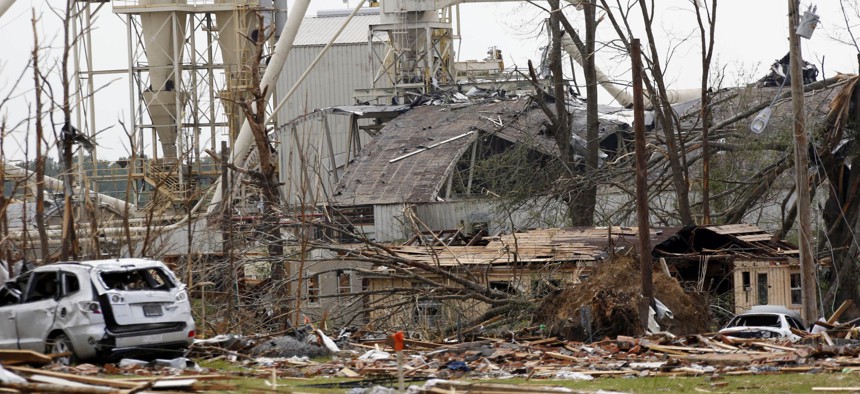FEMA Advised to Claw Back $25 Million From Town Struck By Tornado

In a Tuesday, April 29, 2014 file photo, a wood products plant and its surrounding properties show the heavy damage from Monday's tornado in south Louisville, Miss. Rogelio V. Solis / AP File Photo
The local government in Louisville, Mississippi, “generally complied” with standard accounting requirements for federal aid, but did not follow federal procurement rules in awarding 12 contracts, among other problems, according to a Department of Homeland Security inspector general report.
A $61.7 million emergency federal grant to a Mississippi town coping with an April 2014 deadly tornado was not properly accounted for, the Homeland Security Department’s inspector general reported this month. The IG recommended that the Federal Emergency Management Agency call back about $25 million.
The city of Louisville, where 10 people died from the tornado, storms and flooding, “generally complied” with standard accounting requirements-- with the exception of funds under the Public Assistance Alternative Procedures Pilot program set up in 2013 after Hurricane Sandy devastated the East Coast, the IG said.
The city did not follow federal procurement rules in awarding 12 contracts, “did not take the required affirmative steps to ensure the use of disadvantaged firms when possible, and, for a $600,000 project management contract, the city did not provide full and open competition, use cost as a basis for selection, or perform an adequate cost or price analysis,” the report said.
As of last October, auditors found in the second of two reports, the award provided 75 percent of funding for debris removal, emergency protective measures and permanent work. A destroyed city-owned plywood facility was audited in detail, having received $57.3 million, or 93 percent of the grant as a planned source of new jobs, the report noted.
The city submitted a cost claim of $19.6 million to the state of Mississippi for reimbursement, even though it had not completed work on all impacted projects. And though the City advised FEMA that it had received funding from other federal sources, FEMA did not reduce eligible costs by $1.5 million, which resulted in a duplication of benefits.
Hence, “FEMA should disallow $25.4 million of ineligible costs ($23.9 million for improper contract costs and $1.5 million of duplicate benefits),” the report said.
FEMA officials agreed with the findings and stated they would conduct an environmental and historic preservation review and approve the city’s new scope of work.
Charles S. Clark is Senior Correspondent for Government Executive and is based in Washington, D.C.
NEXT STORY: Navigator Awards Finalists: Next Generation Category






